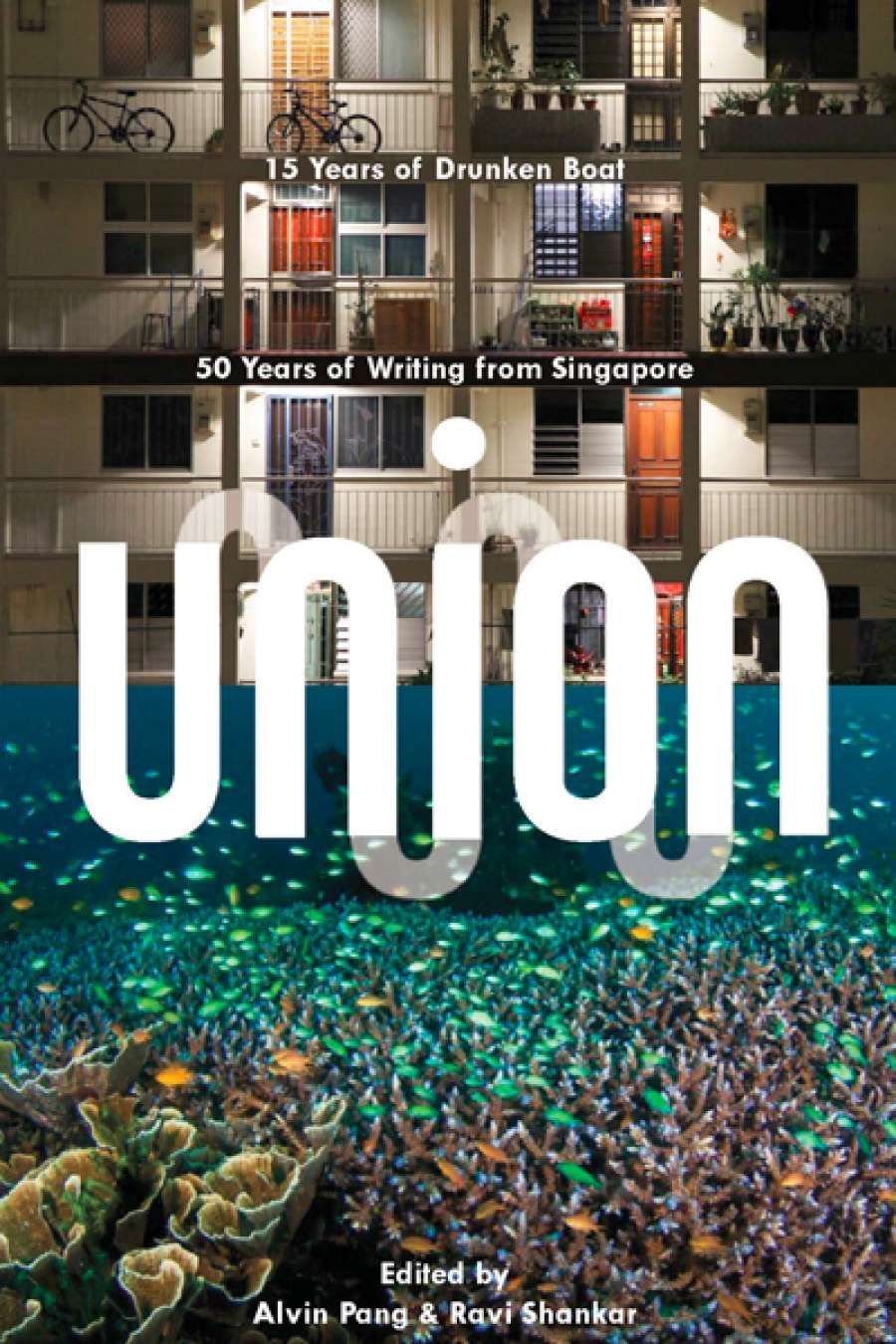
- Free Article: No
- Contents Category: Anthology
- Custom Article Title: Sara Savage reviews 'Union' edited by Alvin Pang and Ravi Shankar
- Book 1 Title: Union
- Book 1 Subtitle: 15 Years of Drunken Boat, 50 Years of Writing from Singapore
- Book 1 Biblio: Ethos Books and Drunken Boat, US$19.90 pb, 640 pp, 9789810964894
Despite their wildly different geopolitical backgrounds and scales, both Singapore and the United States, says Pang in Drunken Boat 21, are 'unapologetically diverse, Anglophone, globally oriented, and with the foundling's sense of newness and possibility unshackled from (but not fully free of) old pieties'. The parallels Pang and Shankar evoke between Singapore and the United States are not absolute or harmonious; nor does it appear they are intended to be. Although the title Union cheekily tips its hat at the grandiose language employed in SG50-esque campaigns, it also refers to the loftier concepts both countries were founded on, which are perhaps responsible for societal anxieties on both shores.
While geographically themed anthologies often suffer from a lack of cohesion between texts beyond their place of origin, Union interrogates this model by situating Singaporean writing in a wider yet ultimately more intricate framework of cultural polyphony across hemispheres and borders. While Singaporean writing only makes up about half of the anthology, the format of Union provides an interesting lens through which to consider it. Singapore as a country can hardly be defined in a vacuum after all, so why must its writers? It is preferable to read the likes of Kim Cheng Boey, Catherine Lim, and Mohamed Latiff Mohamed in a global context, and particularly alongside Drunken Boat 's far-reaching collection of works, from Ko Un and Vijay Seshadri to Kay Ryan and Norman Mailer. The anthology can also be commended for its inclusion of experimental texts, like the visual poetics of Rachel Blau DuPlessis, as well as a vast number of translated works.
 Ann Ang
Ann Ang
It is testament to Union's editorial curation that, despite the diplomatic arrangement of its contents (alphabetically by author), it is replete with meaningful juxtapositions that could otherwise seem intentional. Alfian Sa'at's infamous anti-national-anthem 'Singapore You Are Not My Country' appears early in Union, firing off the anthology like a starting pistol. It has been almost two decades since this explosive and utterly Ginsbergian poem was first published in Alfian's début poetry collection, One Fierce Hour (1998), but it hasn't lost an ounce of significance. Revisiting the poem after the March 2015 death of Singapore's first prime minister, Lee Kuan Yew (of whom Alfian has been openly critical), is particularly revelatory. Deeper into Union, New York writer and memoirist Abigail Thomas's meditation on ageing, 'Memory Loss', an excerpt from her recent memoir What Comes Next and How to Like It (2015), is a fitting precursor to the poem 'Conjunction' from Singapore's Edwin Thumboo. 'For some, grammar is a sacred word / That meditates on them, then leaps, unlocking as she goes, / Disclosing small infinities,' writes Thumboo, his contemplation of the spiritual coincidentally applying here to the masterful interconnectedness of the anthology in which it appears.
The Singaporean portion of Union paints an evocative, honest, and varied portrait of its writers and their subjects, whether local, diasporic, or otherwise. Ann Ang's 'Imaginary Geographies of the Singapore Heartland' takes the form of a Singlish-heavy interview with an 'Uncle' at a kopitiam (coffee shop) in the western region of Jurong. At first sight, it is a simple glimpse into the life of Singapore's 'heartlands' (a term used proudly by the Singapore government to contrast the country's definitive metropolitanism), but on deeper inspection it reveals itself as a deconstruction of the term and its effects on the inhabitants of Singapore's urban fringe. Amanda Lee Koe's 'Why Do Chinese People Have Slanted Eyes?' contends with racism in an affecting sequence of vignettes, while an excerpt from Jee Leong Koh's The Pillow Book (2012) sees seemingly unrelated lists – with titles like 'Things Out of Place' and 'Japanese Things' – weave surprising narratives on the subtle connections between otherwise disparate matters.
The lack of a clear distinction between the Drunken Boat and Singaporean content in Union is indicative of both a robust theme and of expertly curated content by the editors. Union acknowledges the intricacies of identity – infinitely fluid across borders and not simply defined, even by diasporic lines. It is this innate recognition of the many and varied loci of identity by which we can define ourselves that renders the anthology such a success.


Comments powered by CComment